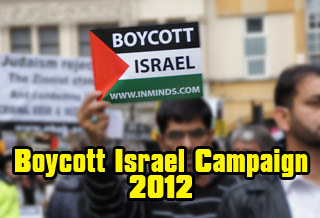
 Innovative Minds © 2014. All Rights Reserved. www.inminds.co.uk | ||||
Defusing Israel's "Demographic Bomb"Hasan Abu Nimah, The Electronic Intifada
According to a new US government report (The State Department's Annual Country Reports on Human Rights Practices for 2004), the Palestinian population in Israel and the occupied territories now exceeds 5.3 million, while the Jewish population stands at 5.2 million
Israel has long lived in fear of the so-called "demographic bomb" -- the fact that the Palestinian population in Israel and the occupied territories is increasing much faster than the Israeli Jewish population. While Israeli Jews thought the day they would become a minority was perhaps still twenty years away, the evidence is increasing that the bomb has already exploded and Palestinians are already a majority in historic Palestine, as they were until Israel was created. According to a new US government report (The State Department's Annual Country Reports on Human Rights Practices for 2004[1]), the Palestinian population in Israel and the occupied territories now exceeds 5.3 million, while the Jewish population stands at 5.2 million. The report states that the population of Israel stands at 6.8 million, of whom 5.2 million are Jews, 1.3 million are Arabs, and 290,000 are other minorities (which apparently includes even more Arabs like Druze and bedouins). The report also puts the number of Palestinians living in the Gaza Strip at approximately 1.4 million, in the West Bank at approximately 2.4 million, and in East Jerusalem at nearly 240,000. This new reality has to be confronted with much more than the symptomatic treatment being applied to the conflict now with the clear intention on Israel's part to buy more time to create more facts on the ground in the form of settlements. The settlements have done much to change the situation, but they, too, are being superseded by other facts on the ground, created by the natural growth of the population. Over the years, Israelis have counselled various approaches to cope with the day when Israeli Jews are a minority population ruling over a majority with no rights. Some advised that Israel should withdraw from much of what its army conquered. Otherwise, they warned, Israel could only preserve its democracy by giving civil and political rights to the enlarged Palestinian population, but lose its "Jewish character". Or it could preserve the Jewishness of the state by maintaining Palestinians as second-class citizens but be openly viewed as an apartheid regime. When Israel was created in 1948, two conditions for its survival in a predictably hostile environment were required. One was the physical removal of much of the indigenous Palestinian population. The other was that it had to possess enough military capability to counter any Arab attempt to defeat, at any time, the Zionist project for Palestine. To meet the first condition, much of the land was ethnically cleansed, starting in 1947 and continuing well into the 1950s. In order to meet the second condition, Israel realised it needed a superpower sponsor -- which it found in the United States -- and quickly built up an impressive conventional and nuclear arsenal. At the end of the 1948 war, Israel had established itself by force on 78 per cent of the historic land of Palestine. Through ethnic cleansing and terror, all but 170,000 Palestinians were forced out of their homes in the area that became Israel. The total of Arab Christian and Muslim population of Palestine in 1946, according to a Palestine government estimate submitted to the United Nations Special Committee on Palestine in 1947, was 1,269,000. About two thirds of all those people were expelled or fled from their homes, towns and villages in Palestine, taking refuge in neighbouring countries. British figures quoted in Benny Morris' book on the Palestinian refugee problem put the number of those who were forced out at 810,000, of which 210,000 went to Gaza, 320,000 went to the West Bank, and 280,000 went to Lebanon, Syria and Transjordan. There were fewer than 600,000 Jews in Palestine on the eve of the war. With most of Palestine depopulated and occupied, Israel seemed to be in control. In later years, Ben Gurion was quoted as saying: "We must do everything to ensure they never return, the old will die and the young will forget." This is exactly what did not happen, with Israel now facing new facts, equally irreversible and much harder than those it created, to counter. It is true that Israel built settlements, confiscated more land, destroyed more houses and farms, ethnically cleansed more Arabs and built by-pass roads (for Jews only), with the result that less than 10 per cent of Palestine remains uncolonised, but rather than reducing the figure of 170,000 Arabs who stayed in Israel, the reality now is that there are more Palestinians than ever, and they exceed the number of Jews despite the decades of efforts Israel made to bring Jews to Palestine from all over the world. What is baffling is that Israel seems to have chosen and predetermined the very thing it feared most. By insisting on keeping the territories it occupied in 1967, it effectively reversed the "benefits" of the ethnic cleansing of 1947-48. Clearly, successive Israeli governments thought they would eventually find a way to keep the land and get rid of the people (physically or politically), but time has only worked against this Israeli intention and yet, Israel's embrace of the occupied territories is only growing tighter as it keeps building settlements while the international community watches and does absolutely nothing to enforce its own laws. The real dilemma now is that if Palestine is to be partitioned, it must be divided according to an equitable formula. The original 1947 UN partition plan for Palestine was grossly unfair because it awarded more than half the country to the Jewish minority which, at the time, numbered no more than one-third of the total population. Naturally, the indigenous Palestinian population wanted nothing to do with such a partition, imposed without their consent by outside powers. But what was unjust and unworkable in 1947 looks very sane compared with what the peace process industry is proposing now -- to squeeze millions of Palestinians into fragmented reservations covering about 10 per cent of Palestine and call it a Palestinian state, while the Israeli Jewish minority continues to control 90 per cent of the country and use it for its exclusive benefit. Neither this nor any other apartheid formula will do anything other than renew and prolong the conflict. A powerful army and a nuclear bomb may have been useful deterrents to Israel when it perceived its main enemies to be surrounding Arab states. But no Arab state presents any remote threat to Israel today. The "enemy" now is right inside Israel and the lands it occupies. It is not an army to be defeated or to be threatened by nuclear weapons. No matter how much military might Israel has, over five million Palestinians cannot be subjected to Israel's cruel, degrading rule forever, nor can they be ethnically cleansed. In any solution, whether it involves two states or one, the only way to defuse this "demographic bomb" is for Israel to abandon the racist doctrines according to which an entire group of human beings -- women, men, the elderly and babies -- are viewed, merely by the fact of their existence, to be a "threat", to be walled in, ghettoized and treated as an alien presence in the land they have lived on and nurtured for generations. Ambassador Hasan Abu Nimah is the former permanent representative of Jordan at the United Nations.
[1]http://www.state.gov/g/drl/rls/hrrpt/2004/41723.htm Source: http://electronicintifada.net/cgi-bin/artman/exec/view.cgi/11/3670 Also Of InterestPage URL: http://inminds.com/article.php?id=10036
|
|
Support Us
If you agree with our work then please support us.Campaigns INMINDS Facebook Live Feed Latest Video's
INMINDS Twitter Feed Tweets by @InmindsComFeatured Video's
You need Flash player 8+ and JavaScript enabled to view this video.
[all videos (over 200)..] Featured MP3 Podcast  "Everywhere we went (in Gaza) the same question was on every body's lips - 'You are here but where are the Arabs?' One little girl said to me 'where is this Arab world that they teach us about in school? Where is this Ummah that they talk to us about on Fridays? Why did they leave us alone?'. That's what she said to me, with tears in her eyes 'why did they leave us alone?' I had to turn my face away from her when she said it, and I'm not an Arab, I had to turn away.. I couldn't face her in the face of such a question.." Leader of Viva Palestina aid convoy to Gaza US tour hosted by Al-Awda, April 2009 [71min / 56Mb] [all podcasts..] Newsletter Feedback |
 |
 |












































